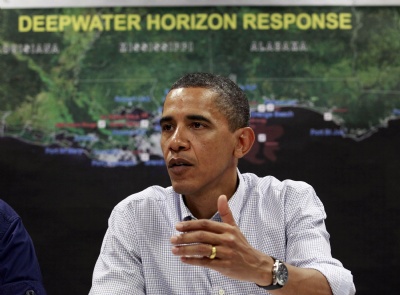
Tony Hayward, BP's chief executive, was served notice on Monday by the committee on energy and commerce that it intends to subject him to the most rigorous inquisition the company has yet faced in the 56-day-old crisis. A letter from the committee's chairman, Henry Waxman, said "time after time, it appears BP made decisions that increased the risk of a blowout to save the company time or expense".
BP is being accused by a US congressional committee of ignoring warnings, violating its own industry guidelines, and choosing risky procedures in the hope of cutting costs and saving time in the days leading up to the catastrophic explosion of the Deepwater Horizon oil rig.
Tony Hayward, BP's chief executive, was served notice on Monday by the committee on energy and commerce that it intends to subject him to the most rigorous inquisition the company has yet faced in the 56-day-old crisis. A letter from the committee's chairman, Henry Waxman, said "time after time, it appears BP made decisions that increased the risk of a blowout to save the company time or expense".
Hayward's hearing will take place on Thursday, towards the end of a crucial week in which the tensions between US politicians and BP are likely to escalate.
Barack Obama will tonight make his first address to the American people from the Oval Office, underlining the scale of the catastrophe now unfolding in the Gulf of Mexico and vowing to hold BP to account for the environmental damage wrought by its eight-week-old oil spill.
Obama is expected to use the speech to outline plans to force the firm to set up an independently monitored multibillion-dollar fund to compensate victims of the spill. He will also lay out a detailed timeline of how the worst of the calamity could be contained.
Hours before the broadcast, the energy and environment sub-committee of the House of Representatives will call senior BP officials in front of it to answer questions on the company's handling of the crisis. Then tomorrow, Obama will hold his first meeting with a team of top BP staff led by the chairman, Carl-Henric Svanberg, and expected to include Hayward who has so far avoided a face-to-face encounter with the president.
But it will be the forensic questioning of Hayward in front of Thursday's committee on energy and commerce upon which BP's fate now potentially hangs. Waxman's advance letter runs to 14 pages and contains damaging allegations gathered during previous hearings.
Five days before the 20 April explosion, the letter contends, BP was warned by its own drilling engineer that this was a "nightmare well". Yet the firm went on to make five crucial decisions that the committee alleges put profit before safety.
BP, at this point, was up against the clock, attempting to complete drilling so that the Deepwater Horizon rig could be moved to another location, avoiding overrun costs.
The five accusations levelled at BP by the committee are:
• That it adopted a cheap design for the well, choosing a single casing rather than a more sophisticated design, despite the fact that its own analysis found strongly in favour of the latter. "The decision appears to have been made to save time and reduce costs," the letter says.
• BP went with the cheapest option of using just six "centralisers", which hold the casing in the centre of the borehole, despite being advised by its contractors Halliburton to use 21. Halliburton warned that the well had a "SEVERE gas flow problem" and that using six centralisers would risk the success of the procedure.
• BP decided not to carry out an acoustic test designed to measure the efficacy of the cementing of the well to block off gas flows. The test would have cost $128,000 and taken an extra 12 hours. An independent engineer who gave evidence to the committee said it was "unheard of" not to perform the test and slammed the decision as being "horribly negligent".
• BP failed to check the proper workings of the new well system by circulating drilling mud from its bottom to the surface. Halliburton suggested the lack of a full test was due to BP's desire for speed.
• The firm did not install a critical piece of equipment that locks the wellhead and the casing at the level of the sea floor. The absence of the "lockdown sleeve" has been identified as one possible cause of the explosion.
Waxman's letter concludes that BP must answer to the committee for possible "carelessness and complacency" that "inflicted a heavy toll on the Gulf, its inhabitants and the workers on the rig.
The new offensive by Congress came as Obama began a two-day visit to the stricken region. After he had landed in Gulfport, Mississippi, he likened the environmental impact of the Deep Horizon explosion to the impact on the national psyche of 9/11.
In an interview with the website Politico, he said: "In the same way that our view of our vulnerabilities and our foreign policy was shaped profoundly by 9/11, I think this disaster is going to shape how we think about the environment and energy for many years to come." The comparison drew some angry responses from families of the victims of the 9/11 attacks.
BP has now passed a 72-hour ultimatum set for it by the Obama administration to come up with a more focused plan for how to bring the spill under control. Worst-case scenarios, estimated by US government scientists, suggest that up to 40,000 barrels of oil could be spewing out into the Gulf each day, with only 15,000 barrels currently being collected by a cap placed over the wrecked well. The company has outlined a series of methods it intends to implement that it claims will see the amount of captured oil rise to up to 80,000 barrels a day by mid-July.














